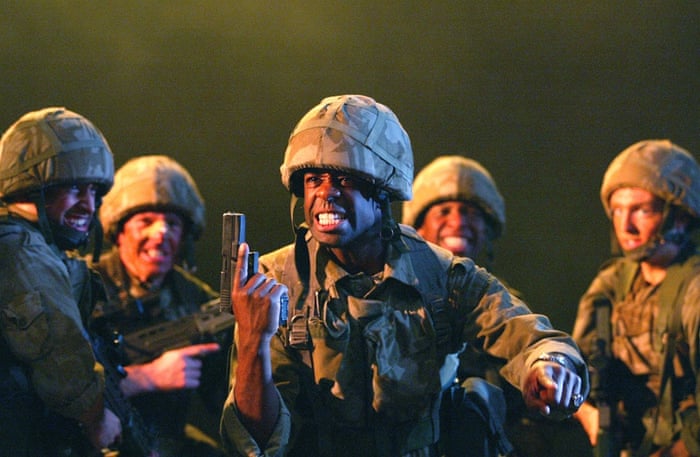Henry V is set early 15th century, King Henry IV has just died and so his son, Henry V, has just taken the throne. Henry has the task of overcoming his adolescent past and winning over the trust of the people. Based on Henry's French roots, and through an ancient land law, Henry lays claims over areas of France. The Pricne Dauphin of France, responds in insults from these claims, causing Henry to decide to invade France and take what he believes is rightfully his. The huge climax of the battle comes with the Battle of Agincourt, 25th October 1415 (Saint Crispin's Day), where the English are seriously outnumbered by the French. After spending the evening talking to his soldiers and praying to God, the English miraculously win the battle. The French have to surrender, however a peace negotiation is made and it is agreed that Henry is to marry the King of France's daughter, Catherine and that their son will unite the two kingdoms.
Nicholas Hytner's 2003 National Theatre production of Henry V takes the original text of the play and places it in the modern world, drawing parallels with the war in Iraq. The title role was played by Adrian Lester as well as my role, the Chorus, being played by Penny Downie. In this video, Downie talks on her view of Hytner's casting of a female in the role of the Chorus. I feel this was an interesting and smart choice artistically as Henry V is an extremely male dominated male with very few female roles, so by casting a female in the role, it gives a stark contrast to the other actors on stage. In this second video, it explains how Hytner and Downie approached the Chorus as if they were also going on a journey with Henry, rather than just purely narrating the story along and that by the last prologue, she's become disillusionised with Henry and the legacy he presents. This is really interesting as it contrasts with the usual casting of the Chorus purely being the storyteller devoted to presenting the story to the audience from the outside of the action with someone who ends up having a real journey within the story and with the characters in a way that isn't usually explored. The chosen concept brings different scenes set in the cabinet room and a pub, as well as the conventional war spaces. This brings and interesting modern twist onto the style and design that's aided by the actors in modern dress as well as the use of modern technology like television.
I feel Henry V is a very easily adaptable play to add different concepts on. It's really interesting to look and research into different productions, especially those with different concepts added on top because not only is it fascinating to learn about different productions, but it's also interesting to see how they contrast with our own approach to Henry V and how they are similar.
Resources: http://www.rsc.org.uk/explore/shakespeare/plays/henry-v/, http://www.whatsonstage.com/west-end-theatre/reviews/05-2003/henry-v-national_26383.html, http://www.playbill.com/news/article/hytners-henry-v-opens-at-londons-national-may-13-113161, EDUCATION PACK ON NICHOLAS HYTNER'S PRODUCTION: http://d1wf8hd6ovssje.cloudfront.net/documents/henry_v.pdf, http://www.shakespearesglobe.com/discovery-space/previous-productions/henry-v

No comments:
Post a Comment